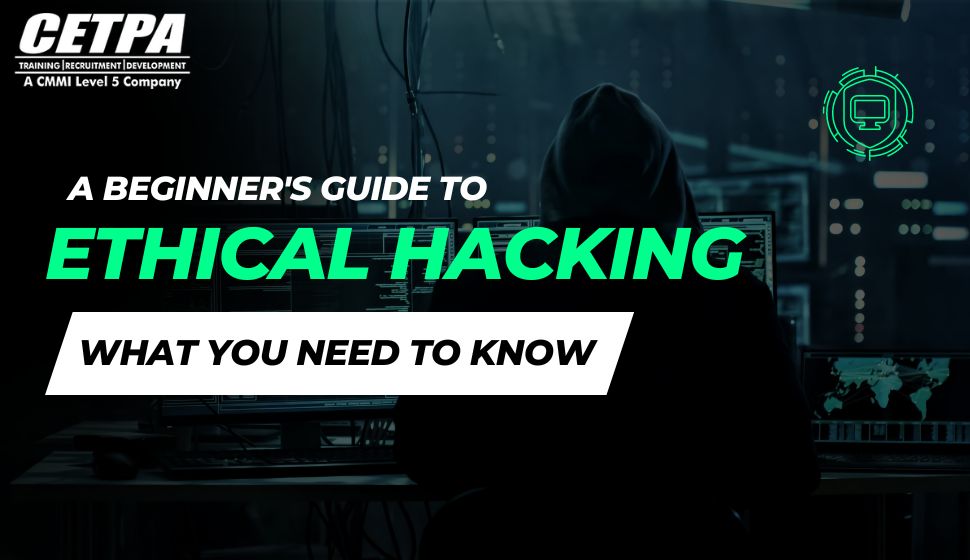Cybersecurity is becoming an important concern for individuals as well as businesses in today’s interconnected world. Ethical hacking, also known as penetration testing or white-hat hacking, plays a crucial role in identifying and fixing vulnerabilities in systems and networks before malicious hackers can exploit them. If you’re curious about Ethical hacking training and considering exploring this field, here’s a comprehensive beginner’s guide to get you started.
What is Ethical Hacking?
Ethical hacking involves authorized and legal attempts to gain unauthorized access to systems, networks, or applications to identify vulnerabilities and weaknesses. Ethical hackers, also known as penetration testers, use their skills and knowledge of hacking techniques to assess the security posture of an organization’s IT infrastructure. The primary goal is to uncover potential security gaps before malicious hackers can exploit them for malicious purposes.
Skills Required for Ethical Hacking
To embark on a career in ethical hacking, certain foundational skills and knowledge are essential:
- Understanding of Computer Networks: Knowledge of how networks operate, including TCP/IP protocols, routers, switches, and firewalls.
- Operating Systems Knowledge: Proficiency in operating systems like Windows, Linux, and Unix, including their command-line interfaces and security features.
- Programming Skills: Familiarity with programming languages such as Python, Java, or scripting languages like Bash or PowerShell, to automate tasks and understand exploit code.
- Security Concepts: Understanding of common security principles, cryptography, vulnerabilities, and attack vectors.
Ethical Hacking Methodology
According to a well known ethical hacking training, ethical hacking follows a structured methodology to ensure thorough testing and assessment of security controls:
- Reconnaissance: Gathering information about the target system or network using passive methods such as footprinting and scanning.
- Scanning: Actively probing the target to discover open ports, services running, and potential vulnerabilities.
- Gaining Access: Exploiting vulnerabilities to gain access to systems or escalate privileges, often using techniques like password cracking, SQL injection, or buffer overflow attacks.
- Maintaining Access: Establishing persistent access to the compromised system to gather more information or perform further attacks.
- Covering Tracks: Erasing evidence of the intrusion to maintain stealth and avoid detection.
Career opportunities in ethical hacking
After completion of Summer training in ethical hacking, here are some key career opportunities that one might opt:
- Penetration Tester/ Ethical Hacker:The job of penetration testers, sometimes referred to as ethical hackers, is to find and take advantage of weaknesses in systems, networks, or applications.
- Security Consultant: Security consultants provide expert advice and guidance to organizations on improving their overall cybersecurity posture. They create security guidelines and protocols, carry out risk assessments, and suggest improvements to security.
- Incident Responder: Incident responders are responsible for investigating and responding to cybersecurity incidents, such as data breaches or malware infections.
- Security Analyst: Security analysts monitor and analyze security events and alerts to detect potential threats or suspicious activities. They use security information and event management (SIEM) tools to correlate data and identify patterns indicative of cyber attacks.
- Cyber Security Engineer: Cyber Security engineers design, implement, and maintain secure systems and networks.
- Ethical Hacking Trainer/ Educator: Experienced ethical hackers may choose to transition into roles as trainers or educators, sharing their knowledge and expertise with aspiring cybersecurity professionals. They develop training programs, deliver workshops or Ethical Hacking courses on ethical hacking techniques and methodologies
- Chief Information Security Officer (CISO): At the executive level, Chief Information Security Officers (CISOs) oversee an organization’s entire cybersecurity strategy and operations.
Conclusion
Ethical hacking is a vital component of cybersecurity strategies, helping organizations proactively identify and mitigate vulnerabilities. Aspiring ethical hackers should continuously update their skills, stay informed about emerging threats, and adhere to ethical standards to contribute effectively to the cybersecurity ecosystem. By mastering the techniques and methodologies of ethical hacking, you can play a crucial role in safeguarding digital assets and contributing to a safer online environment.
So, why wait? Join an Ethical hacking training institute today! And enhance your skills in ethical hacking and contribute effectively to the cybersecurity ecosystems.
Source URL:- https://xuzpost.com/a-beginners-guide-to-ethical-hacking-what-you-need-to-know/
